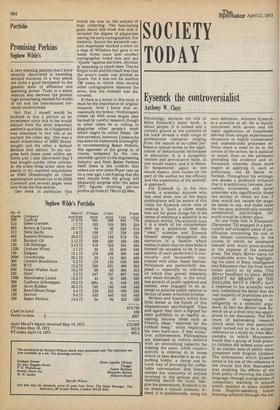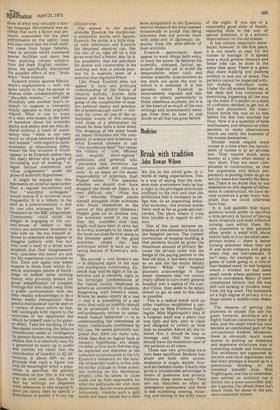Eysenck the controversialist
Anthony W. Clare
Psychology, declares the title of Hans Eysenck's latest book, is about people. It is indeed and a cursory glance at the contents of his book reveals a wide range of professional concerns ranging from the nature of so-called per!missive sexual mores to the appli cation of behaviourist techniques in education. It is a pungently written and provocative book, as one would expect, and it is libera lly bespattered, again as one would expect, with claims on the
part of the author for the efficacy and the superiority of his scientific approach.
For Eysenck is, in his own words, a scientist. Anyone who has read even one of his many publications will be aware of this claim for Eysenck never tires of making it. Such a claim marks him out for great things for in his terms of reference a scientist is no ordinary mortal. The scientist (and it is a mark of his consummate skill as a polemicist that the " ideal " scientist and Eysenck himself merge throughout the narrative in a fashion which makes it plain that he does believe himself on occasion to be in possession of such perfection) is continually and favourably contrasted with other, lesser mortals. Politicians are particularly despised — especially on television on which they grovel, miserably and weak-mindedly, in the mindless pursuit of public approval and esteem, ever engaged in an attempt to polarise public opinion in favour of some wretched scheme.
Writers and literary critics fare. little better at the hands of this dispassionate psychologist. Time and again they earn a reproof for their gullibility in so readily accepting fatuous ideas such as Freud's, ideas "destined for the rubbish heap," while neglecting his own hard-won, if less attractive, achievements. Philosophers are dismissed as tedious pedants with an astonishing capacity for missing the point, while creative activity is referred to in terms which at best describe it as an absorbing hobby, a clever and fecund way of providing for coffeetable conversation and literary soirees but unworthy of anyone involved in the serious and demanding search for truth, Despite his pretensions, Eysenck is by no means a typical scientist; indeed, it is questionable, using his
own definition, whether Eysenck is a scientist at all. He is mainly concerned with power and his rapid application of hypotheses derived from simple experimental situations to highly complicated and sophisticated processes reflects more a need to be in the centre of the action, be it political. or social, than on the perimeter providing the evidence and information whereby those more. expert at applying it, such as politicians, can be better informed. Throughout his writings, one senses a profound irritation that it is politicians, lawyers, journalists, economists and social scientists who significantly shape the society in which we live; if they would but vacate the stage, he seems to say, and make room for the sane, scientifically-minded, unemotional psychologist the world would be a better place.
So one finds him in Encounter (December '72) engaged in a particularly self-indulgent piece of justification concerning his role in the Jensen controversy, in the course of which he entertains . himself with much point-scoring at the expense of the national press. The Daily Mirror earns his considerable scorn for highlighting his claim in Race, Intelligence and Education that the Irish score rather poorly on IQ tests. (The Mirror headlined its piece: IRISH AREN'T AS BRAINY AS THE ENGLISH, SAYS A PROF) Such a response to his scientific work only underlined his belief that the vast majority of journalists are incapable of responding intelligently to a scientific argument. In fact the Mirror took Eysenck on at a level only too appropriate to his discussion. The fifty years of painstaking research which went into that particular ' claim turned,out to be a solitary reference to a study by John Macnamara in which Macnamara found that a group of Irish primary children did indeed score poorly on certain tests of ability when compared with English children. The information which Eysenck omits in his use of the reference is the crucial fact that Macnamara was studying the effects of the Irish policy of reviving the Gaelic language through a programme of compulsory teaching in schools which resulted in many children from English-speaking homes
• learning subjects through the me
dium of what was virtually a foreign language. Macnamara was satisfied that such a factor was primarily responsible for the poor Performance on the ability tests and also noted that the Irish children came from larger families, went to schools which possessed Poorer facilities and spent less time studying certain subjects than did their English counterparts. He specifically discounted the possible effect of any " brain drain " from Ireland.
Eysenck totally ignores Macnamara's explanations — well, not quite totally in that he pauses to dismiss them condescendingly as " plausible reasons" — and coldbloodedly uses another man's research to support a viewpoint totally opposite to that originally argued. What is one to make of a man who boasts to the point of boredom about his scientific Purity and ability and yet who declares without a, trace of uncertainty that "there is not very much to choose between England , and Ireland "with regard to socioeconomic or educational differences? On this occasion it would appear to be Eysenck rather than the Daily Mirror who is guilty of trivialising and of making "alleged factual statements and value judgements" under the guise of scientific hypotheses. "
It Might be argued that this represents an atypical lapse rather than a regular occurrence and that " watchful colleagues" would notice if it occurred more frequently. It is a tribute to his skill as a controversialist — and no one who witnessed his performance on the BBC programme, Controversy could doubt his delight in engaging in the cutand-thrust of debate — that critics are somewhat reluctant to take him on. He has himself referred to scientists who appear to disagree publicly with him but Who over a meal or a drink soon establish that their disagreement only concerns the minor p's and q's. My experience runs counter to this. Time and again, one meets experts in fields from which Eysenck scavenges pieces of knowledge to bolster some striking theory who privately lament his gross simplification of complex findings but who back away from a public confrontation with one they readily acknowledge to be a better media manipulator. How good a manipulator can be seen in a variety of ploys which he himself catalogues with regard to the activities of his opponents but Which he himself uses to far greater effect. Take his handling of the discussion concerning the relative contribution made to intelligence by genetic factors. He handsomely admits that it is relatively easy for a geneticist to stand up in public and contest his claim that the contribution of heredity to IQ differences is about 80% on the grounds that such a figure can Only be meaningful when a population is specified. He quickly reassures us that this is the only Way he ever uses the figure. In fact his writings are peppered With references to this magical figure yet rarely does he specify a Population or qualify it in any sig nificant way.
The answer to the puzzle whereby Eysenck the statistician is somewhat remiss with figures, Eysenck the purist is a little sloppy with references and Eysenck the detached observer can, like the rest of us, take off on a trip given even half a theory, may lie in the possibility that his penchant for power and controversy is his undoing and that in actual practice he is scarcely more of a scientist than Sigmund Freud.
Like Freud, Eysenck does not appear to have any profound understanding of the nature of creative activity, knows little history and has not the faintest grasp of the complexities of modern political theory and practice. He is breathtakingly naive — contrast his views on one of the cataclysmic events of this century with those of a philosopher for whom he does have a kind word. The dropping of the atom bomb on Japan illustrates not the complicity of science and scientists in what Eysenck chooses to call "this murderous deed "but rather the villainy of "cold, efficient and stupidly short-sighted "_ politicians and generals who "perverted this invention for their own selfish and inhuman ends." In an essay on the moral responsibility of scientists, Karl Popper writes, "The question whether we should ever have dropped the bomb on Japan is a very difficult one." (Note the " we " whereby Popper places himself alongside those scientists who found themselves in the centre of this ghastly dilemma.) Popper goes on to analyse why the scientists acted in the way they did, concedes that they might well have been in error but in no way attempts to let them off the hook nor does he ever stoop to the tiresome game of the good scientists versus the bad politicians which is such an irritating feature of Eysenck's writings.
His naivete — and Jensen's too — is displayed again in the race and intelligence controversy. Eysenck may well be right in his assertions and is certainly right in his forthright condemnation of the fascist tactics employed in American universities by students disagreeing with Jensen's views. Where he seems utterly at a loss — and it is something of a sad irony that such an inability should be so prominent in a man who self-professedly strives to understand human behaviour — is in understanding the uneasiness of many intellectuals confronted by his case. He seems genuinely surprised that there are many who, while they find no logical fault in Jensen's hypotheses, are deeply troubled at how such theories may be exploited and distorted in the turbulent racial situation in the US. Eysenck's insistence on the sanctity of scientific truth is in line with his earlier attitude to those scientists working on the Manhattan project, who he seems to claim could not be held responsible for what the politicians did with their discoveries. But not every scientist, fortunately, inhabits such a split world and many would feel a little more sympathetic to the Eysencks and the Jensens if the latter seemed occasionally to accept that being scientists does not provide them with some sort of diplomatic immunity from the after-effects of their activities.
Eysenck particularly does appear to want things both ways; to have the power he believes his scientific, unbiased, factual approach deserves yet to avoid the responsibility when such and similar scientific interventions do not work out quite the way in which it is intended. It is this paradox which Eysenck so remorselessly exposes and destroys in others, particularly in those rebellious students, yet it is at the heart of so much of his own writings and intermittently emerges from time to time to cast doubt on all that has gone before.



































 Previous page
Previous page